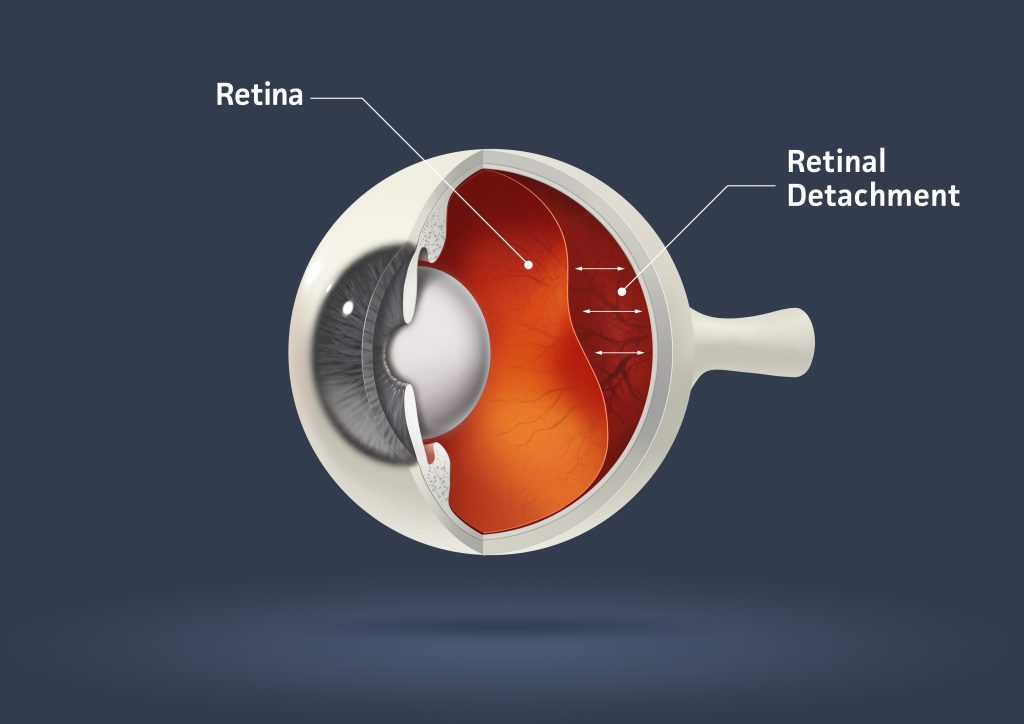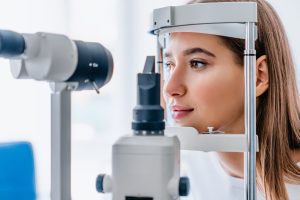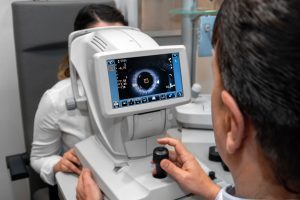Can a detached retina fix itself?
No, a detached retina cannot fix itself. Retinal detachment is a medical emergency and requires prompt medical attention to preserve vision. If you experience any warning signs of retinal detachment, seek medical care immediately. If you call our clinic and state you are experiencing new flashes of light or new onset of floaters, we will make every effort to adjust our schedule and see you as soon as possible. If we are unable to see you we would advise you to proceed directly to the Royal Alexandra Hospital for on-call assessment. We would not advise any other hospital in the area as the Royal Alex is the only hospital with on-call eye care. Laser treatment or surgery is usually required to repair a detached retina. If you are concerned about symptoms of retinal detachment, call us immediately. Early detection and treatment are key to preserving your vision.
Retinal detachment is a serious condition that requires immediate medical attention
Retinal detachment is a serious condition that requires immediate medical attention and cannot resolve on its own. Here are some additional details about retinal detachment and its treatment:
- Retinal detachment: The retina is a layer of tissue located at the back of the eye that is responsible for capturing visual images and sending them to the brain. Retinal detachment occurs when the retina becomes separated or pulled away from its normal position. This can result in a loss of vision if not treated promptly.
- Warning signs: There are warning signs that may indicate a retinal detachment, such as the sudden onset of floaters (small specks or cobweb-like particles) in your vision, flashes of light, a curtain-like shadow moving across your field of vision, or a sudden decrease in vision. If you experience any of these symptoms, it is crucial to seek immediate medical attention.
- Prompt medical care: Time is of the essence when it comes to retinal detachment. Seeking prompt medical care increases the chances of successful treatment and preserving vision. In the provided statement, it is emphasized that if you experience new flashes of light or new onset of floaters, you should contact the clinic or proceed directly to the Royal Alexandra Hospital for urgent evaluation.
- Treatment options: Laser treatment or surgery is typically required to repair a detached retina. The specific approach depends on the severity and location of the detachment. Laser treatment, known as photocoagulation, is often used for small tears or holes in the retina to create scars that help seal the retina back into place. Surgery, such as pneumatic retinopexy, scleral buckle, or vitrectomy, may be necessary for more advanced cases of retinal detachment.
- Importance of early detection: Detecting retinal detachment early is crucial for successful treatment. The longer the retina remains detached, the higher the risk of permanent vision loss. Regular eye exams are essential for detecting any signs of retinal detachment or other eye conditions, especially if you have risk factors such as a family history of retinal detachment or certain eye diseases.
- Follow medical advice: If you are concerned about symptoms of retinal detachment, it is important to follow the advice provided by your healthcare professionals. They will guide you on the appropriate steps to take, which may include urgent appointments, referrals to specialized eye care centers, or emergency hospital visits.
Remember, this information is not a substitute for professional medical advice. If you suspect a retinal detachment or have any concerning symptoms, it is crucial to consult with an eye care specialist or seek immediate medical attention to ensure the best possible outcome for your vision.

Related FAQs
Wearing glasses or contacts can indeed affect dry eye symptoms, but the impact varies. Glasses can help shield the eyes from environmental factors that exacerbate dry eye, such as wind or air conditioning. On the other hand, contact lenses can sometimes worsen dry eye symptoms by absorbing tear moisture or by causing irritation. Certain types of contact lenses are designed to be more breathable and retain moisture better, which may be suitable for people with dry eyes. It’s crucial to discuss with an eye care professional to find the most appropriate type of contact lens or glasses. Proper care and hygiene when using contacts, along with regular breaks from screen use, can help minimize dry eye symptoms.
Dry eye syndrome can be both a temporary condition and a chronic disease, depending on its cause and severity. Environmental factors or certain life situations, such as screen use or air travel can cause temporary dry eye. Chronic dry eye, on the other hand, may result from systemic diseases, medication side effects, or age-related changes in tear production. Management and treatment can alleviate symptoms, but chronic dry eye often requires ongoing therapy. It’s important to consult with an eye care professional for an accurate diagnosis and treatment plan. Understanding the underlying cause is key to determining whether dry eye syndrome will be a temporary issue or a chronic condition.
Yes, some specific exercises and therapies can help relieve dry eye symptoms. Blinking exercises, for example, can help improve meibomian gland function and tear film stability. Warm compresses applied to the eyes can also stimulate tear production and release oils from the glands in the eyelids. Gentle eyelid massages can help spread the oils evenly across the eye surface, reducing dryness. Using a humidifier to add moisture to the air and taking regular breaks to rest the eyes during screen time can also be beneficial. Newer technologies such as IPL (Intense Pulsed Light) and RF (Radio Frequency) are also becoming available. Consulting with an eye care professional for personalized advice on exercises and therapies is recommended.
Sleep plays a crucial role in managing dry eye syndrome. Poor sleep can lead to insufficient eye lubrication and worsening dry eye symptoms. During sleep, the eyes rejuvenate and produce the moisture needed for the next day. Good sleep hygiene practices can help ensure the eyes are well-rested and hydrated. It’s also important to avoid sleeping with any airflow directly hitting the face, as this can dry out the eyes. Establishing a regular, restful sleep schedule can significantly improve dry eye symptoms.
Indeed, some medications can exacerbate dry eye symptoms. Diuretics, antihistamines, antidepressants, and some blood pressure medications are known to reduce tear production or alter tear composition. It’s important to review any current medications with a healthcare provider to determine if they could be contributing to dry eye symptoms. Sometimes, alternative medications with fewer dry eye side effects can be prescribed. Always consult with a healthcare professional before making changes to medication regimens. Patients should also stay hydrated and consider using artificial tears if taking medications known to cause dryness.
Yes, it is quite common for dry eye symptoms to worsen in certain weather conditions. Dry, windy, or smoky environments can lead to increased tear evaporation, exacerbating symptoms. Conversely, high humidity can sometimes alleviate dry eye symptoms because the air is more saturated with moisture. Cold weather, especially during winter when indoor heaters are used, can also dry out the eyes. It’s advisable to use humidifiers in such conditions to maintain indoor humidity levels. Wearing wraparound glasses or protective eyewear outdoors can help shield eyes from harsh conditions.
West Edmonton Vision Clinic
Visit our vision clinic in central West Edmonton for comprehensive eye exams, contact lens fittings, glasses, and more. LL Eyecare Centre is dedicated to providing the highest quality optometric services and products to our patients. Our team of experienced optometrists is here to help you with all of your eye care needs. Schedule an appointment today!
Clinic Hours
Monday Closed
Tuesday 9:00-5:00
Wednesday 9:00-5:00
Thursday 9:00-5:00
Friday 9:00-5:00
Saturday 9:00-2:00
Closed Sunday / Holidays




